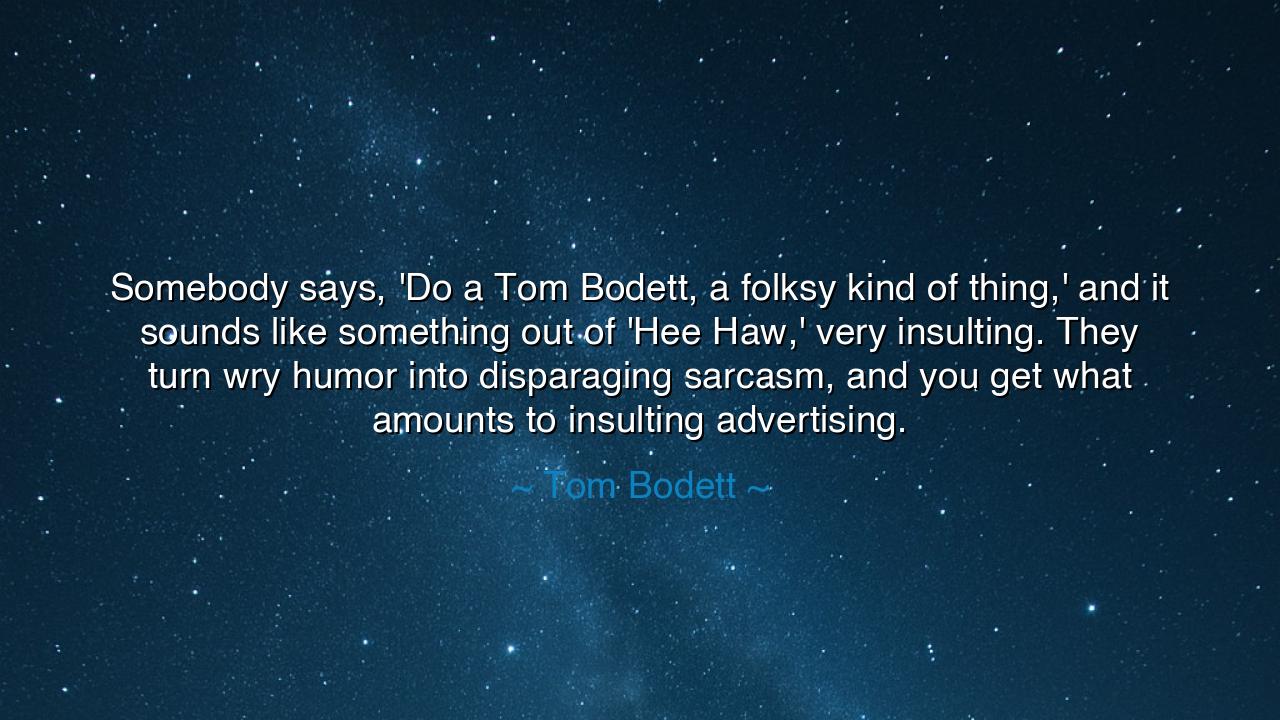
Somebody says, 'Do a Tom Bodett, a folksy kind of thing,' and it
Somebody says, 'Do a Tom Bodett, a folksy kind of thing,' and it sounds like something out of 'Hee Haw,' very insulting. They turn wry humor into disparaging sarcasm, and you get what amounts to insulting advertising.






“Somebody says, ‘Do a Tom Bodett, a folksy kind of thing,’ and it sounds like something out of ‘Hee Haw,’ very insulting. They turn wry humor into disparaging sarcasm, and you get what amounts to insulting advertising.”
Thus spoke Tom Bodett, the storyteller whose voice once carried warmth across the airwaves, inviting travelers to rest in simplicity and kindness. His words, though born from the world of commerce, rise far beyond it, touching upon an eternal truth — that authentic humor springs from empathy, not mockery, and that sincerity, once twisted into irony, becomes cruelty. In this lament lies the cry of all true artists and communicators: that wit must never lose its heart, and that humor divorced from humanity is not wit, but scorn.
To “do a Tom Bodett” — as he describes with irony — became, in the hands of others, a caricature of the very thing he had created. Where he once spoke with gentleness, others imitated with condescension. His “folksy” tone, meant to honor the honesty of ordinary people, was reduced to parody. Here we see the great danger that faces all art born of humility: the danger that authentic simplicity will be mistaken for foolishness, and that tenderness will be replaced by cynicism. What Bodett calls “insulting advertising” is but a reflection of a deeper sickness in the human spirit — the loss of respect for the common soul.
In the ancient world, the philosopher Horace warned poets that satire must never wound without purpose. He taught that true wit corrects, but never destroys. The jester, the humorist, and the storyteller hold a sacred role — they reveal folly while preserving dignity. Yet, when laughter turns from the shared to the cruel, when the storyteller no longer sees himself in those he mocks, humor becomes a weapon rather than a mirror. Bodett’s grievance, though modern in form, echoes this timeless principle: that kindness is the soul of wit, and that to mock what is genuine is to strip life of its warmth.
Wry humor, as Bodett speaks of it, is a delicate art. It balances insight with compassion, wisdom with warmth. It allows one to laugh at life without despising it. It was this quality that made his storytelling so beloved — his humor never looked down upon others, but invited them to see the wonder in their own smallness. Yet when others sought to imitate his tone without his heart, they produced sarcasm, which is humor turned bitter — a distortion of laughter, like sunlight fractured through broken glass. In this lies a profound truth: the intent behind words gives them their nature. What is spoken in love heals; what is spoken in contempt divides.
Consider the wisdom of Aesop, the ancient teller of fables. His stories, filled with animals and fools, were never cruel, though they exposed vanity and pride. His fox and crow, his tortoise and hare — they made people laugh at themselves and learn. But imagine those same tales told without kindness — the laughter would curdle into ridicule, the lessons into judgment. So it is with Bodett’s warning: when sincerity is replaced by sneer, the story ceases to uplift. Humor without compassion becomes arrogance disguised as cleverness.
The origin of Bodett’s words lies in his own legacy. As the familiar voice behind the phrase, “We’ll leave the light on for you,” he became a symbol of warmth, comfort, and trust. His humor was not grand or intellectual — it was human. But as imitators sought to bottle and sell his tone, they stripped it of its sincerity, turning it into a stereotype — the “folksy” trope he describes. In his frustration, we glimpse a universal truth about all communication: that authenticity cannot be manufactured. True connection is born from honesty, not imitation.
So, let this teaching be carried into all hearts:
-
Guard the heart of your humor, that it may lift, not wound.
-
Speak with sincerity, for people recognize truth more deeply than cleverness.
-
Honor simplicity, for it is not weakness, but the root of all wisdom.
-
Reject mockery, for it is the laughter of the hollow and the fearful.
Thus spoke Tom Bodett, the humble humorist who reminded the world that kindness is the highest art. His words are not merely a defense of style, but a defense of spirit — a call to preserve the dignity of laughter itself. For in every age, there are those who turn the gentle into the cynical, the wise into the sarcastic, the real into the artificial. Yet the soul that speaks with warmth, honesty, and wry grace remains eternal. So let us, like Bodett, light our lamps with humor that welcomes, not wounds — for only laughter born of love can truly illuminate the dark.






AAdministratorAdministrator
Welcome, honored guests. Please leave a comment, we will respond soon